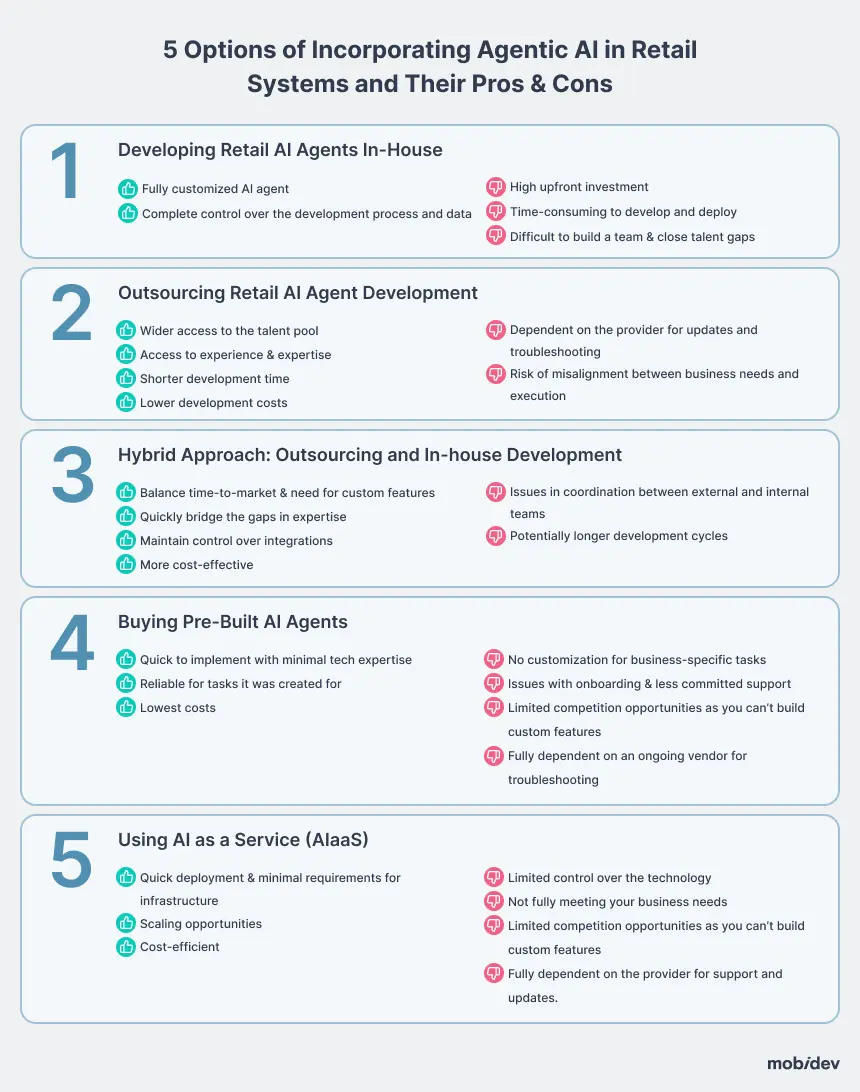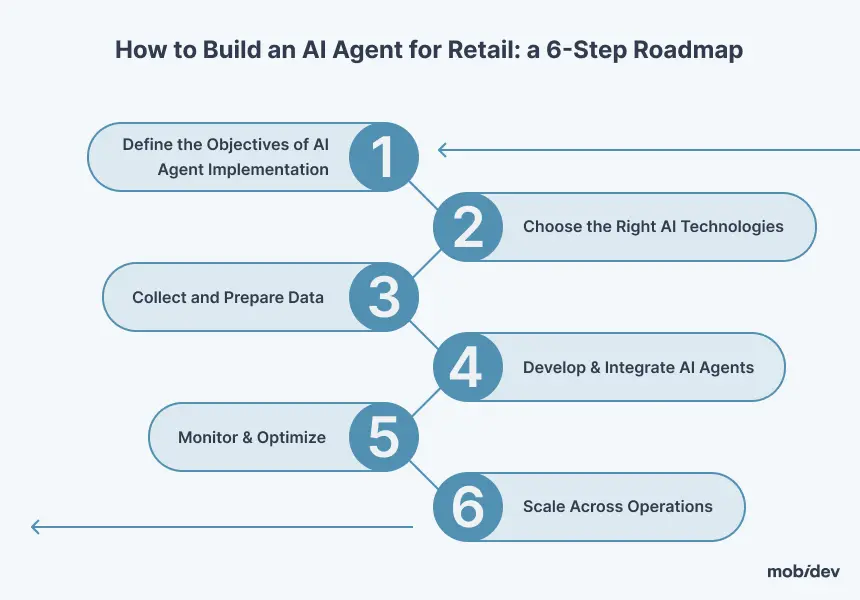Contents:
Today’s retailers are caught between the need for modernization and the challenges of technology updates. On the one hand, implementing novel solutions like AI agents in retail offers deeper insights for decision-making and new ways to improve customer experiences. On the other hand, high upfront costs, lack of technical expertise, and not knowing which solutions you need and where to start can block your progress.
Iurii Luchaninov, a Solution Architect at MobiDev with 20+ years in software development, helps approach these blockers by giving an overview of the existing kinds of agentic AI in retail, the benefits they bring to your business, and ROI-effective strategies of AI implementation.
Iurii created this guide for both retail businesses looking to boost their operational efficiency and SaaS providers aiming to gain a competitive advantage in the volatile market. It demonstrates how Agentic AI can benefit retail operations and provides a clear roadmap for building agents.
The Growing Role of AI Agents in Retail
As AI brings benefits from short and long-term perspectives, its adoption in retail is growing. Evidently, the market size of AI in Retail is projected to grow by 32.68% annually in 2025-2030.
This trend is a clear signal for retailers and retail software developers alike: AI is a valuable tool and a necessary tech investment. According to Nvidia, 9 out of 10 retailers already use or assess AI in their operations, while 57% use it for more than six use cases.
At the same time, retailers and retail SaaS providers are still exploring ways to benefit the most from AI. The priority directions are to store analytics and insights, personalize customer recommendations, offer adaptive advertising, benefit promotions and pricing, help with inventory management, and offer conversational AI.
At the same time, overall investment remains modest. Companies have yet to fully realize AI’s impact on their business. This creates an opportunity to step in and gain momentum as the competition rises. Already, 97% of retailers using AI say they will invest more as their use cases mature.
We predict that agentic AI will be of central interest to retail businesses and retail SaaS developers, as it comprises all of the features that they need most:
- bringing automation to a higher level by reducing manual tasks and decision fatigue
- helping with real-time decision-making while AI agents can adapt dynamically to changing inputs
- providing personalization at scale, as retail AI agents enable intelligent recommendations that simplify customer interactions
- efficiency improvements and cost saving as a result of reduced manual routines.
Webinar: AI Agents in Retail as The Next Step in AI Adoption
AI agents in retail refer to programs that can autonomously perform tasks on behalf of a user. Unlike other types of software, AI agents can execute complex, multitask workflows in any part of business operations, including, but not limited to, decision-making, problem-solving, interacting with external environments (scanning inventory), and communicating with customers.
AI agents are a natural evolution of the existing retail software. The first automation in retail software was rule-based and followed predefined steps, like removing a purchased item from an inventory list. Predictive AI added analysis of shopping behavior and learned to spot trends. Generative AI in retail expanded services, with chatbots being able to have conversations with users but not being able to perform independent actions.
During our recent webinar “From Vision to Revenue: How AI Agents Transform Retail SaaS Platforms,” my colleague Helen Khailova-Horash, Senior Solutions Manager at MobiDev, and I shared how we help retail companies bring AI agents from idea to measurable results. Helen focused on the business case for adoption, showing how AI-driven automation can cut support costs, boost profits, and accelerate innovation. She emphasized what C-level leaders need to know when evaluating modular AI frameworks, ROI scenarios, and the executive roadmap for SaaS transformation.
From my side, I concentrated on the technical side of implementation—the architecture of AI agents, their components (memory, APIs, LLMs), and the challenges of integrating them into legacy systems. I explained how compliance and data quality shape the reliability of agentic AI, and why prototyping is often the best way to de-risk new initiatives. Together, we gave attendees both the strategic lens to see the business impact and the technical depth needed to make informed decisions about scaling AI agents in retail.
Watch the webinar recap and find the link to the full recording below the video.
Watch The Full Webinar Recording
MobiDev experts break down real use cases, key development strategies, and actionable tips to help you leverage AI for smarter, faster, and more efficient retail operations.
Watch the WebinarKey 4 Benefits of AI Agents in Retail
To understand better what benefits to expect from AI agents for retail, we need to focus on key challenges retail businesses face, like growing demand for improved customer experience, insufficient efficiency of internal operations, and lack of insights for decision-making and competition. Here’s how incorporating retail AI agents in software can help:
1. Improved Customer Experience
No longer limited to answering basic questions, AI agents in retail and e-commerce can recommend personalized products and even detect customer sentiments to reduce decision fatigue while increasing customer satisfaction.
For example, AI agents in retail and e-commerce can populate shopping carts based on a conversation with customers or run the complete cycle of grocery shopping, from product selection to payment and ordering delivery, without direct customer interaction. When it comes to product choice, for example, in shoe shopping it can help pick products based on cushioning metrics, customer weight, and durability scoring. This way, agentic AI increases the chances of a customer’s satisfaction with a product and cuts down the number of return cases.
Also, retail AI agents help retailers combat cart abandonment by offering timely support and reducing frustration. They also shorten customer journeys and assist in building friendly relations with customers by remembering their preferences.
2. Increased Efficiency
AI agents in retail can act like hyperefficient virtual coworkers, eliminating routine tasks. A company adding agentic AI to its software can completely automate things like inventory audits or customer support. Going beyond a mere bot, an AI agent can add or replace products in the shopping cart or offer exclusive discounts.
Companies offering retail SaaS solutions also benefit from AI agents. When enhanced with agentic AI solutions, the retail SaaS tools are more productive, compared to ones without agentic features.
3. Data-Driven Insights
Incorporated into retail software, AI agents enhance real-time insights thanks to their operational ability to scrape and process huge amounts of data at any moment. That is why retailers receive better visibility into market trends, customer preferences, and behaviors.
4. Competitive Advantage
As AI agents in retail untie their hands to run numerous operations at the same time, retailers implement innovations faster than competitors. Agentic AI for customer support allows them to handle more user queries and agents for inventory tracking allow them to build better restocking strategies.
At the same time, Retail SaaS companies implementing AI features into their products, give clients an opportunity to withstand harsh market competition. Moreover, software with agentic AI is more future-ready and having this feature in their offerings allows retail SaaS providers to secure a competitive advantage for their customers in the long term.
Top 15 Retail AI Agents Use Cases
Basically, you can build an agentic AI solution for any use case, but the most popular are as follows:
| # | Retail Software Type | Description | AI Agent Modernization & Improvement Capabilities |
|---|---|---|---|
| 1 | Point of Sale (POS) Systems | POS systems manage inventory, analytics, in-store transactions, payment processing, and sales tracking. | AI Checkout Agents automate checkout processes, detect fraud in real-time, provide personalized recommendations, and engage in up and cross-selling. |
| 2 | Inventory Management Software | Tracks stock levels, replenishment, and supply chain. AI-powered versions forecast demand and automate restocking. | Intelligent Stock Agents predict demand patterns, auto-replenish inventory, provide recommendations on how to optimize the supply chain, and more. |
| 3 | Retail Enterprise Resource Planning (ERP) | ERP integrates finance, inventory, HR, and supply chain management. | AI ERP Agents automate workflows, optimize procurement, and detect inefficiencies in supply chain operations. |
| 4 | Customer Relationship Management (CRM) for Retail | A CRM manages customer data and loyalty programs and provides the basis for personalized marketing. | AI-powered engagement agents automate customer interactions, predict churn, and provide hyper-personalized marketing recommendations. |
| 5 | E-commerce Platforms | An e-commerce platform manages product listings, customer orders, payments, and fulfillment. AI enhances search, recommendations, and pricing. | Conversational Shopping Agents provide AI-powered recommendations, assist customers in decision-making, and automate responses to FAQs. |
| 6 | Order Management Systems (OMS) | OMS centralizes order processing across multiple sales channels (online, in-store, mobile) for improved fulfillment. | AI Order Processing Agents automate order validation, detect fraud in real-time, and optimize delivery routes. |
| 7 | Retail Analytics & Business Intelligence (BI) | Analytics provides insights into sales trends, customer behavior, and demand for data-driven decision-making. | AI Decision Support Agents generate insights, forecast trends, and recommend business strategies in real-time. |
| 8 | AI-Powered Personalization & Recommendation Engines | Personalization engines use machine learning to analyze customer preferences and suggest relevant products. | Personal Shopping AI Agents offer individualized recommendations, dynamic bundling, and promotions based on customer behavior. |
| 9 | Workforce & Scheduling Software | Scheduling software optimizes employee scheduling, tracks labor costs, and enhances workforce productivity. | AI Workforce Optimization Agents predict staffing needs, automate shift scheduling, and optimize labor efficiency. |
| 10 | Retail Security & Fraud Detection Software | Fraud detection software deals with fraudulent transactions, prevents chargebacks, and secures customer data using AI and machine learning. | Fraud Detection AI Agents monitor transactions in real-time, identify anomalies and prevent financial losses. |
| 11 | Self-Checkout & Automated Kiosk Software | Self-checkout software enables customers to scan and pay without cashier assistance, improving checkout efficiency. | AI-powered self-checkout Agents assist with real-time scanning errors, detect fraud, and offer in-store recommendations. |
| 12 | Price Optimization & Dynamic Pricing Software | Dynamic pricing software adjusts product prices in real-time based on demand, competition, and market conditions. | AI-pricing agents optimize pricing in real-time, track competitor pricing, and personalized discounts. |
| 13 | Augmented Reality (AR) & Virtual Shopping Software | Enhances the shopping experience with virtual try-ons, AI-assisted styling, and interactive product visualization. | Virtual Shopping Assistants provide AI-driven styling recommendations, product matching, and interactive shopping experiences. |
| 14 | Warehouse & Logistics Management Software | Warehouse software optimizes warehouse operations, automates fulfillment, and integrates with route planning. | AI Logistics Agents optimize warehouse layout, manage autonomous inventory movement, and streamline last-mile delivery. |
| 15 | Omnichannel Retail Software | Omnichannel retail software unifies in-store, online, and mobile customer interactions for seamless experiences. | AI Omnichannel Agents ensure personalized shopping experiences across all touchpoints, predicting customer needs in real-time. |
Incorporating Agentic AI in Retail Systems: 5 Options
There are several ways to implement agentic AI systems into retail software development, including in-house development, outsourcing to a third-party vendor, a hybrid approach using AI builders, and AI-as-a-Service. Each method has specific outcomes to expect and conditions to provide.
1. Developing Retail AI Agents In-House
Developing retail AI agents in-house is best for businesses that need complex, monolithic solutions to get super-smooth operations internally and offer industry-leading experiences externally.
These are usually established companies with legacy retail software and AI-native retail startups. Logically, they have different needs and project paths.
For startups that operate on modern tech stacks and don’t yet have a large and solid client base, building AI agents for retail is more or less straightforward.
Industry old-timers often have to integrate agentic AI development into broader digital transformation initiatives, as rigid legacy systems are not AI-ready. They require a special approach that minimizes risks for existing processes and eliminates any disruption of client services.
It is worth having a clear understanding of challenges. Nvidia reports that among businesses that ran or assessed similar projects in 2024, 31% experienced difficulties in recruiting and retaining AI experts and data scientists, another 31% had issues with budgets, and 33% lacked explainable AI tools.
Staff augmentation or involving external specialists to join your in-house team in developing agentic AI for retail is a good way to circumvent these challenges. This business model allows you to involve specialists with expertise your team lacks and also saves money on hiring costs (those connected with leaves, bonuses, and healthcare).
At the same time, external staffers usually have extensive experience in change management and can provide consulting and advice to secure the transition process.
ARE YOU CONSIDERING TEAM AUGMENTATION?
MobiDev is Here to Help You Boost Your Development Capacity with
Team Augmentation ServicesBasically, with the in-house development of AI in retail, you can expect the following pros and cons:
PROS
- You get fully customized AI agents
- You receive complete control over the development process and data
- Custom-built AI agents are more flexible to align with unique business goals
CONS
- High upfront investment
- Time-consuming to develop and deploy
- It’s hard to find specialists with the required expertise and understanding of business needs
2. Outsourcing Retail AI Agent Development
Outsourcing is the process of hiring third-party developers to design, develop, and deploy AI retail agents for you. Unlike in-house development, you are not directly involved in project management, as the outsourcing team takes over project handling.
This option doesn’t require as large an upfront investment as in-house development, but the success depends on the qualification of the third-party team and their understanding of your specific business needs.
The latest point is often the most important. To illustrate, at MobiDev, we develop AI solutions as external modules to avoid disrupting the well-established infrastructure and processes of legacy systems. In deployment, we stick to a phased approach to ensure minimal risks. This way, we provide frictionless modernization while respecting your business’s need for adaptation.
This approach can maximize the expected benefits. The overall pros and cons of outsourcing retail AI agent development are as follows:
PROS
- Wider access to the talent pool
- Vendors usually have all the tools, practices, and talent in place, so you may expect shorter development time
- Thanks to the absence of organizational expenses (recruiting, legal, HR) and regional differences in rate, the option is more affordable than in-house development
CONS
- This option makes you dependent on the vendor for future updates and troubleshooting
- There is a risk of misalignment between your business needs and vendor execution
- Possibly longer onboarding time
LOOKING FOR AN EXTERNAL TEAM to develop an agentic AI?
MobiDev offers cost effective
AI Agent Development Team3. Hybrid Approach to Retail AI Agent Development
A hybrid approach to AI agent development lets you combine outsourcing and in-house development to balance risks and expenses. Usually, an in-house team develops a strategy and vision and provides for risk-free integration with existing systems, while an outsourcing team handles AI model training and development.
PROS
- You can balance time-to-market with the need for custom features
- Involving external help is a great way to quickly bridge the gaps in expertise while maintaining control over integrations
- Compared to an in-house approach, going hybrid is more cost-effective
CONS
- There may be issues in coordination between external and internal teams
- Potentially longer development cycles
- Managing hybrid teams requires an extra learning curve
At the same time, it is important to make sure the core business objectives stay in focus. At MobiDev, we provide consulting on merging outsourcing efforts with in-house development with little risk to the project.
Ready to Harness Expertise in Building AI Agents for Retail?
MobiDev Business Analysts and Tech Experts are Ready to Help You with
AI Consulting Services4. Buying Pre-Built AI Agents
There are ready-made solutions for AI agents in retail that can be attached to your software and perform different functions, such as fraud detection, customer service, inventory management, etc. These agents are based on large language models like GPT and can be integrated into your ERP or CRM via APIs.
Quite often, these solutions are task-based. For example, you can choose to buy an inventory management agent, one for customer service, one for online marketing and other retail-related tasks or a combination of these.
The pros and cons of incorporating a pre-built retail AI agent into retail software are as follows:
PROS
- Quick to implement with minimal tech expertise: you can install an agent in minutes
- Lower costs in comparison to custom development from scratch
- Reliable for tasks it was created for
CONS
- Little space left for customization; therefore,ready-made retail AI agents may not be effective when dealing with some business-specific tasks
- Possible issues with onboarding, as you don’t get the full spectrum of support like in the case of in-house development or outsourcing
- There is still a need for ongoing vendor support
5. Using AI as a Service (AIaaS)
Big cloud platforms like Amazon Web Services, Google Cloud, and Microsoft Azure offer cloud-based AI solutions that can be used as AI agents for retail. These platforms have pre-built AI capabilities for different use cases, like inspecting inventory stocks, processing returns, answering customer queries, or giving recommendations.
They use the reasoning of foundation models and retrieval augmented generation (RAG) to draw data from your in-house software (like ERPs, CRMs, etc.), to which they connect via APIs and offer a short path to get started.
AIaaS solutions can help automate various small tasks. Therefore, it is recommended to build task-based, focused agents, not large and monolithic ones. For example, you can build a separate agent that counts inventory to determine stockouts and another one to answer customer questions on product details.
The advantages and downsides of AIaaS solutions to build retail AI agents are:
PROS:
- Quick deployment and minimal requirements for infrastructure
- Possibilities for scaling will grow as providers will offer new features You avoid the costs of keeping a large AI department in-house
CONS:
- Limited control over the technology as you cannot align the solutions with your needs
- Limited competition opportunities since you cannot build custom features that can differentiate you from other companies in your business niche
- You are still dependent on third-party service providers for support and updates.
How to Build a Custom AI Agent to Automate Retail Operations: a 6-Step Roadmap
The roadmap for building an AI retail agent consists of six milestones. Here’s what you need to do to build an AI agent.
Step 1: Define the Objectives of AI Agent Implementation
At this point, you should decide the focus area of your business to improve.
For Retailers: You may follow objectives connected with improving in-house operations, like warehouse management, financial or tax operations, or adaptive personnel schedule management
For Retail SaaS providers: If you wish to add agentic AI features to your service offering, it’s necessary to run research on the primary needs of your audience. Everyone needs automation yet urgent needs require immediate reaction. Ask your clients what features they would like to have with the next update: personalized recommendation, cross- and up-selling efforts, providing customers with timely information on product details, etc.
Step 2: Choose the Right AI Technologies
The areas you want to improve first will define the technology you use. For example, if you want a voice assistant at a self-service POS terminal, you need conversational AI, which is based on voice recognition, natural language processing, text-to-speech, and speech-to-text technology.
Optical character recognition (OCR) will be needed for a robotic agent that automatically updates your inventory level or an agent that defines ideal product placement.
If you need to process historical sales records, you may need intelligent document processing algorithms (IDP).
Step 3: Collect and Prepare Data
Retail AI agents often predict trends based on historical records. For them to be productive, clean and structured data is needed. The more data you have, the better the output quality you’ll receive.
Step 4: Develop & Integrate AI Agents
At this stage, the development team builds the actual software and tests it in the real world. It is important to ensure that an AI agent works in a team with other software and that there are no blockers to streamlining task performance.
Step 5: Monitor & Optimize
Not a single AI solution is foolproof. If a model is trained on historical data, it may need optimization if a sudden market disruption occurs. There have been cases where outfit or cosmetics trends using AI prediction tools went to stockouts as a celebrity influencer suddenly highlighted their brand.
That’s why creating a retail AI agent isn’t a one-time endeavor. It requires continuous monitoring and optimization.
Step 6: Scale Across Operations
If the first implementations of AI agents in retail are successful, they may be expanded to other use cases across the system.
Future Trends and Innovations in AI Agents for Retail
Those investing in AI agents in retail and e-commerce may be sure they are doing the right thing, as this technology will develop further in the next 5-10 years. The primary areas will be a higher level of independence and automation. We can expect wider implementation of voice-based technologies, the IoT, and robotics.
Customer shopping histories will become an important asset in training hyper-personalized AI agents that can elevate the comfort of customer journeys even more.
At the same time, the rise of self-service solutions and further experimentation with AR in retail will transform both offline and online customer journeys.
Businesses implementing AI agents for retail now will be better adapted for the future. For example, having AI agents that track customer interactions with a brand and can self-improve will provide the basis for hyper-personalization in customer experience, thus ensuring the business will maintain a competitive edge in the long term.
Why Build Your Retail AI Agent with MobiDev
If you are considering building an AI retail agent for your business or as a SaaS product, MobiDev is here to help. Our range of services foresees any of your possible needs, from AI consulting to full-scale agentic AI development.
Our AI development team works closely with you to maximize the output’s effect, depending on your business conditions. We provide the optimal implementation paths to include all the requirements specifics, whether you build a solution from scratch or implement agentic AI into the existing software infrastructure.
We will ensure a scalable and highly effective solution in any scenario. For more than a decade, MobiDev has been collaborating with leading POS providers like Comcash (acquired by POS Nation) and SmartTab. Our expertise in retail software development services helps our clients achieve their business needs, and our solutions provide tangible benefits to stay ahead of the competition.
Learn more about AI agent development services to unlock their potential for your business, or contact our expert team today.






